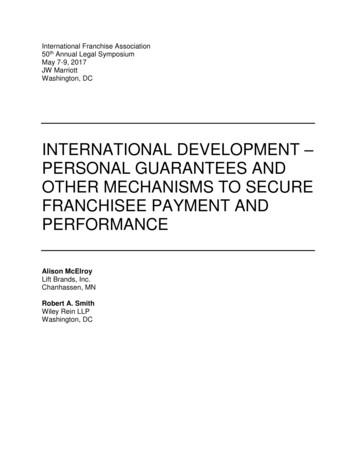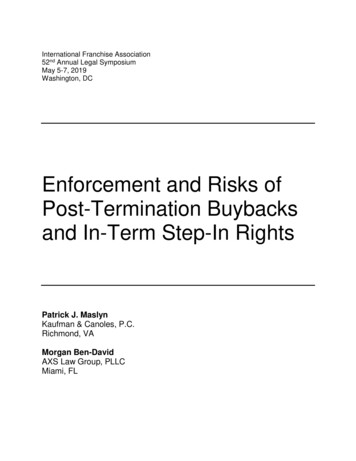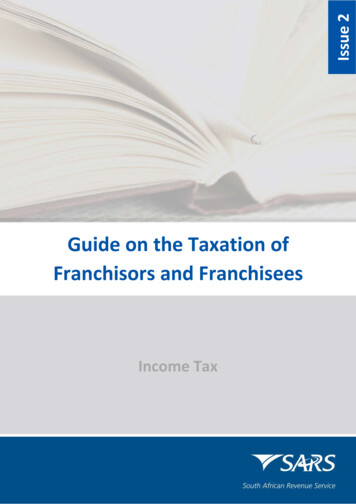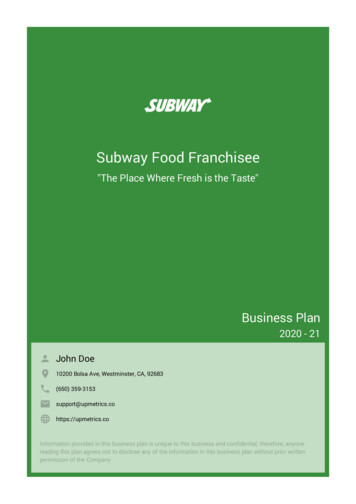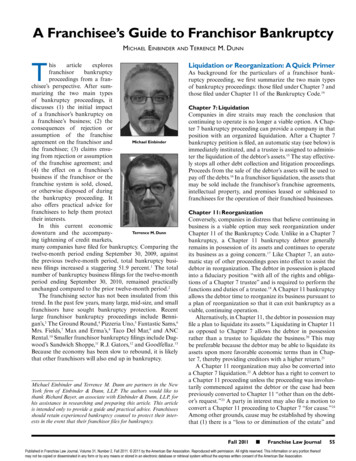
Transcription
A Franchisee’s Guide to Franchisor BankruptcyMichael Einbinderand T eedings from a franchisee’s perspective. After summarizing the two main typesof bankruptcy proceedings, itdiscusses (1) the initial impactof a franchisor’s bankruptcy ona franchisee’s business; (2) theconsequences of rejection orassumption of the franchiseMichael Einbinderagreement on the franchisor andthe franchisee; (3) claims ensuing from rejection or assumptionof the franchise agreement; and(4) the effect on a franchisee’sbusiness if the franchisor or thefranchise system is sold, closed,or otherwise disposed of duringthe bankruptcy proceeding. Italso offers practical advice forfranchisees to help them protecttheir interests.In this current economicTerrence M. Dunndownturn and the accompanying tightening of credit markets,many companies have filed for bankruptcy. Comparing thetwelve-month period ending September 30, 2009, againstthe previous twelve-month period, total bankruptcy business filings increased a staggering 51.9 percent.1 The totalnumber of bankruptcy business filings for the twelve-monthperiod ending September 30, 2010, remained practicallyunchanged compared to the prior twelve-month period.2The franchising sector has not been insulated from thistrend. In the past few years, many large, mid-size, and smallfranchisors have sought bankruptcy protection. Recentlarge franchisor bankruptcy proceedings include Bennigan’s,3 The Ground Round,4 Pizzeria Uno,5 Fantastic Sams,6Mrs. Fields,7 Max and Erma’s,8 Taco Del Mar,9 and ANCRental.10 Smaller franchisor bankruptcy filings include Dagwood’s Sandwich Shoppe,11 R.J. Gators,12 and Goodfellaz.13Because the economy has been slow to rebound, it is likelythat other franchisors will also end up in bankruptcy.Michael Einbinder and Terrence M. Dunn are partners in the NewYork firm of Einbinder & Dunn, LLP. The authors would like tothank Richard Bayer, an associate with Einbinder & Dunn, LLP, forhis assistance in researching and preparing this article. This articleis intended only to provide a guide and practical advice. Franchiseesshould retain experienced bankruptcy counsel to protect their interests in the event that their franchisor files for bankruptcy.M. DunnLiquidation or Reorganization: A Quick PrimerAs background for the particulars of a franchisor bankruptcy proceeding, we first summarize the two main typesof bankruptcy proceedings: those filed under Chapter 7 andthose filed under Chapter 11 of the Bankruptcy Code.14Chapter 7: LiquidationCompanies in dire straits may reach the conclusion thatcontinuing to operate is no longer a viable option. A Chapter 7 bankruptcy proceeding can provide a company in thatposition with an organized liquidation. After a Chapter 7bankruptcy petition is filed, an automatic stay (see below) isimmediately instituted, and a trustee is assigned to administer the liquidation of the debtor’s assets.15 The stay effectively stops all other debt collection and litigation proceedings.Proceeds from the sale of the debtor’s assets will be used topay off the debts.16 In a franchisor liquidation, the assets thatmay be sold include the franchisor’s franchise agreements,intellectual property, and premises leased or subleased tofranchisees for the operation of their franchised businesses.Chapter 11: ReorganizationConversely, companies in distress that believe continuing inbusiness is a viable option may seek reorganization underChapter 11 of the Bankruptcy Code. Unlike in a Chapter 7bankruptcy, a Chapter 11 bankruptcy debtor generallyremains in possession of its assets and continues to operateits business as a going concern.17 Like Chapter 7, an automatic stay of other proceedings goes into effect to assist thedebtor in reorganization. The debtor in possession is placedinto a fiduciary position “with all of the rights and obligations of a Chapter 7 trustee” and is required to perform thefunctions and duties of a trustee.18 A Chapter 11 bankruptcyallows the debtor time to reorganize its business pursuant toa plan of reorganization so that it can exit bankruptcy as aviable, continuing operation.Alternatively, in Chapter 11, the debtor in possession mayfile a plan to liquidate its assets.19 Liquidating in Chapter 11as opposed to Chapter 7 allows the debtor in possessionrather than a trustee to liquidate the business.20 This maybe preferable because the debtor may be able to liquidate itsassets upon more favorable economic terms than in Chapter 7, thereby providing creditors with a higher return.21A Chapter 11 reorganization may also be converted intoa Chapter 7 liquidation.22 A debtor has a right to convert toa Chapter 11 proceeding unless the proceeding was involuntarily commenced against the debtor or the case had beenpreviously converted to Chapter 11 “other than on the debtor’s request.”23 A party in interest may also file a motion toconvert a Chapter 11 proceeding to Chapter 7 “for cause.”24Among other grounds, cause may be established by showingthat (1) there is a “loss to or diminution of the estate” andFall 2011 Franchise Law Journal 55Published in Franchise Law Journal, Volume 31, Number 2, Fall 2011. 2011 by the American Bar Association. Reproduced with permission. All rights reserved. This information or any portion thereofmay not be copied or disseminated in any form or by any means or stored in an electronic database or retrieval system without the express written consent of the American Bar Association.
rehabilitation of the debtor is unlikely or (2) the estate hasbeen grossly mismanaged.25Initial Impact of a Franchisor’sBankruptcy on a FranchiseeWhen a franchisor files for bankruptcy, the immediate effecton its franchisees is often dramatic. The challenge for a franchisee of a bankrupt franchisor is how to stay in businessduring the franchisor’s bankruptcy. A Chapter 7 liquidatingfranchisor is not likely to meet any of its contractual obligations to its franchisees. Although this may also be trueof a Chapter 11 franchisor, many Chapter 11 franchisorsperform their contractual obligations during the pendencyof their bankruptcy proceeding because they may need tokeep the franchise agreements in place both to fund continued operations and to reorganize successfully. Thus, forChapter 11 proceedings involving a franchisor, the affectedfranchisee may be able to continue to conduct business ina semblance of its usual manner. However, the word willbe out and the effect on business immediate. If a franchisor ceases to perform its contractual obligations, franchiseeswill experience the loss of the system-wide marketing programs, training and operational assistance, and supply chainsupport, all of which are essential to a franchise system. Ineither event, in both Chapter 7 and Chapter 11 proceedings,franchisees will experience increased negative publicity concerning the franchise system, resulting in a loss of goodwillin the brand.Loss of Franchisor SupportThe loss of the system-wide marketing programs, trainingand operational assistance, and supply chain support can bedevastating to a franchisee. This generally occurs in a Chapter 7 proceeding or a Chapter 11 proceeding in which thedebtor does not plan on continuing to operate the franchisesystem. If a bankrupt franchisor ceases to provide its franchisees with this support, franchisees must take immediatesteps to perform those services themselves or locate alternative sources.Some franchisors collect contributions from franchiseesfor a brand fund. Franchisors will generally use that fund todevelop marketing materials for the franchise system, purchase advertising media, implement marketing campaigns,develop and maintain the franchise system’s Internet presence, conduct market research, and review any marketingmaterials prepared by the franchisee. These activities maycease during a bankruptcy proceeding. A franchisee’s ability to respond by marketing its own business during thebankruptcy proceeding may be hindered if the franchiseagreement prohibits a franchisee from preparing its ownmarketing materials or advertising. A franchisee may chooseto disregard that prohibition as a matter of necessity. In thealternative, the franchisee may file a motion with the bankruptcy court for relief from the automatic stay to compel thefranchisor to approve the franchisee’s marketing materialsor allow the franchisee to advertise.26Assuming that a franchisee is able to conduct its ownmarketing programs and purchase its own advertising media,doing so on its own may be cost prohibitive. Generally, franchisors are able to obtain lower pricing for such programsbecause of their bargaining power. A franchisee shouldexplore every means to conduct marketing, including devoting more money to its marketing budget, marketing withother franchisees, or even marketing with other businesses.Many franchisors also provide franchisees with training and operational assistance throughout the term of theagreement. Having an experienced franchisor available toprovide training, operating assistance, or both concerningnumerous issues, including accounting and tax matters,employee management, and point-of-sale operations, is aninvaluable asset. Without the franchisor’s support in theseareas, a franchisee may have to allocate a significant amountof time to those issues, time that otherwise could be used tomanage and oversee the normal day-to-day operations ofits business.In some franchise systems, the franchisor directly provides or arranges for goods and services for its franchisees.If the franchisor no longer supplies those products and services, a franchisee must somehow continue to obtain them.The concern here is twofold: (1) the franchisor is the exclusive provider of the goods or services but will no longer provide them, and/or (2) the price offered to franchisees wasonly available because of the franchisor’s buying power. Afranchisee will have to attempt to acquire goods and servicesdirectly from the franchisor’s suppliers or from other capable suppliers. If a franchisee is unable to acquire the goodsand services, the franchisee must make the business decisioneither to acquire different goods and services or cease offering them. In either case, the franchisee may face violation ofthe franchise agreement.With respect to the costs of purchasing goods and services, franchisees may lower their costs if they pool theirresources and assert whatever collective buying power theyhave. Similarly, as mentioned above, franchisees should consider sharing in the costs of developing and implementingmarketing programs. A common way that franchisees cancollectively take action is through forming advertising andpurchasing cooperatives. If they are effectively able to operate these cooperatives, they may be able to assert their combined buying power and negotiate lower prices for goodsand services and advertising and marketing materials.Loss of GoodwillThere is a stigma associated with bankruptcy. The public’simmediate reaction to news of a bankruptcy proceedinginvariably will be negative. This often results in a loss ofgoodwill in the bankrupt franchisor’s name and trademarks.Additionally, if company-owned units close simultaneouslywith the franchisor’s bankruptcy filing, the public may mistakenly believe that all units, whether company-owned orfranchised, will shut down. The closure of company-ownedunits further exacerbates the loss of goodwill, as occurredin the Bennigan’s and The Ground Round bankruptcies.27In each of those cases, media outlets reported stories about56 Franchise Law Journal Fall 2011Published in Franchise Law Journal, Volume 31, Number 2, Fall 2011. 2011 by the American Bar Association. Reproduced with permission. All rights reserved. This information or any portion thereofmay not be copied or disseminated in any form or by any means or stored in an electronic database or retrieval system without the express written consent of the American Bar Association.
Practical Recommendations#1: Keep your eyes and ears open.A franchisee should be mindful of its franchisor’s financial condition and should pay careful attention to anywarning signs of financial strain. It is important to develop emergency plans just in case the franchisor files forbankruptcy or has an involuntary petition filed against it.Emergency plans may include keeping a list of alternatesuppliers, forming advertising and purchasing cooperatives prior to or immediately after a franchisor’s bankruptcy, maintaining a list of local media sources, andpreparing press releases ready for distribution. A franchisee should be ready to implement these emergency plansif and when necessary.#2: Retain bankruptcy counsel.Due to all of the potential issues, concerns, and rights ofa franchisee discussed in this article, the authors stronglyadvise that franchisees of a bankrupt franchisor retainbankruptcy counsel knowledgeable in both bankruptcyand franchise law. Bankruptcy counsel can assist a franchisee with filing a proof of claim; monitor the franchisor’s bankruptcy proceeding; oppose any action likelyto harm the interests of the franchisee; and negotiatewith the debtor, the trustee, or a prospective assignee onbehalf of the franchisee.#3: Organize with other franchisees.Franchisees should seek to be recognized as an officialcreditors’ committee. Franchisee interests can be betterrepresented if franchisees are well organized. Amongother responsibilities, the creditors’ committee couldrenegotiate terms of the franchise agreement with thefranchisor (or a purchaser of the franchise assets). Thecreditors’ committee could obtain more favorable terms,including, but not limited to, lower royalty rates, lessstringent performance and/or purchase requirements,and greater input in the management and operation ofthe franchise system going forward.#4: Don’t miss bankruptcy proceeding dates.A franchisee of a Chapter 7 franchisor should pay carefulattention to the bar date to file claims against the franchisor. A franchisee of a Chapter 11 franchisor should file itsclaims against the franchisor by the filing date set by thecourt. If claims are not filed timely, it may be difficult tothe franchisor’s bankruptcy filing and the abrupt closure ofcompany-owned restaurants.28 The goodwill of the franchisor’s brands was dealt a considerable blow, particularly inthe case of The Ground Round, where some patrons wereasked to leave in the middle of their meals.29Soon after a franchisor files for bankruptcy, a franchiseeshould act to dispel any rumor that its independently ownedassert those claims later. Additionally, franchisees shouldmonitor the deadline for the trustee or debtor to reject orassume franchise agreements and other executory contracts as well as the date to object to any cure amount.Also, in a Chapter 11 proceeding, franchisees should monitor the debtor’s deadline to file its reorganization plan.#5: Begin a relationship with a new franchisor andinvestigate renegotiating your franchise agreement.If it becomes apparent that the trustee or the debtorwill sell the franchise system to a third party, franchiseesshould take that opportunity to investigate the potentialpurchaser to determine if the purchaser has the financialwherewithal to operate the franchise system properly. Ifit does not, franchisees may object to the proposed saleon the basis that the purchaser has not provided adequate assurance of future performance (11 U.S.C. § 365(b)(1)(C)). Franchisees should renegotiate the terms oftheir franchise agreements, if possible. In this way, upontransfer of the franchise system, both the new franchisorand the franchisees can hit the ground running, havingalready resolved any potential issues.#6: Be prepared to take action concerning noncompetition provisions.In the event of a rejection of a franchise agreement, afranchisee should file a motion with the bankruptcy court(or a state court upon first obtaining relief from the automatic stay) requesting a declaration that the franchisee isnot obligated to comply with the non-competition provisions contained within the franchise agreement. Obtaining such a declaration will help the franchisee to continueto do business with minimal interruption.#7: Explore your rights to continue using the franchisor’s trademark.In the event of a rejection of its franchise agreement, afranchisee should inquire about purchasing or licensingthe franchisor’s trademarks and intellectual property sothat the franchisee can continue to operate its businesswith minimal interruption. Even licensing the trademarksand intellectual property for an interim period wouldallow a franchisee to transition its business to operateunder other trademarks.franchised business is closing, is in peril, or is in any wayharmed by the franchisor’s bankruptcy. A franchisee shouldimmediately contact its local newspapers, radio, and television news agencies to inform the public that (1) the franchisee will remain open during the franchisor’s bankruptcyproceeding, and (2) the bankruptcy will not affect the franchisee’s business.Fall 2011 Franchise Law Journal 57Published in Franchise Law Journal, Volume 31, Number 2, Fall 2011. 2011 by the American Bar Association. Reproduced with permission. All rights reserved. This information or any portion thereofmay not be copied or disseminated in any form or by any means or stored in an electronic database or retrieval system without the express written consent of the American Bar Association.
The next step for a franchisee is to generate positive newsand regain some of the lost goodwill. An effective way to dothat is for franchisees to organize and form an advertisingcooperative, as mentioned above, and to develop and implement a centralized marketing and advertising campaign.The advertising cooperative will have to assemble quicklyand begin providing all of the marketing and advertisingservices previously provided by the franchisor.Pre-Packaged Plans: Limiting Loss of Support orGoodwillSome franchisors file a pre-packaged plan (a reorganizationplan prepared prior to a bankruptcy filing) with a bankruptcy court. In a pre-packaged plan, the debtor negotiateswith creditors and shareholders in advance of filing for bankruptcy.30 The purpose of a pre-packaged plan is to shorten aChapter 11 proceeding, eliminate uncertainty concerning theterms of the debtor’s reorganization, and minimize the debtor’s expenses and loss of goodwill.31 Sometimes the pre-packaged plan is simply a cleanup of the franchisor’s balance sheetinvolving the exchange of bank or bond debt for equity orthe facilitation of a sale to a third party. The franchisor continues to perform under its franchise agreements during thebankruptcy proceeding, and there may be little or no effect onthe goodwill of the franchise system because the franchisorbankruptcy is not reported on a consumer level but is merelyreported in trade publications. Accordingly, these plans typically require no action or special planning by franchisees.The Mrs. Fields bankruptcy is a good example of a prepackaged plan.32 There, the franchisor was able to exit bankruptcy soon after its filing with a healthier balance sheetbecause it was able to exchange old bond debt for cash, newbond debt, and an equity interest in the franchisor.33Rejection or Assumption ofFranchise AgreementThe Bankruptcy Code allows a debtor or trustee to rejector assume an executory contract.34 The Bankruptcy Codedoes not define the term executory contract. However, courtshave defined executory contract as a contract “under whichthe obligations of both the debtor and the other party to thecontract are so far unperformed that the failure of either tocomplete the performance would constitute a material breachexcusing the performance of the other.”35 It is well settled thata franchise agreement is an executory agreement.36 Accordingly, a fundamental concern for franchisees is whether theirfranchise agreements will be rejected or assumed by the trustee (Chapter 7 or Chapter 11) or the debtor.Franchisee RightsA franchisee may want to take action to compel assumption or rejection rather than waiting for the lengthy processto unfold. Chapter 7 trustees have sixty days from the petition date to either reject or assume an executory contract,and Chapter 11 debtors have until the reorganization plan isconfirmed to do the same unless extensions are obtained.37In Chapter 7, executory contracts not assumed within theallotted time period are deemed to be rejected.38 Reorganization plans can take months or years before they are confirmed. Franchisees of a Chapter 11 franchisor may notknow for some time whether their franchise agreements willbe rejected or assumed as part of the reorganization plan.This is problematic because, for example, in a Chapter 11case, prior to the debtor’s decision to reject or assume, thedebtor may enforce an executory contract against otherparties, but those same parties cannot enforce the contractagainst the debtor.39 Therefore, during the pendency of afranchisor’s Chapter 11 bankruptcy, a franchisor can requirea franchisee to perform under the franchise agreement, buta franchisee cannot compel the franchisor to do the same.Instead of waiting months or years for the franchisor tomake a decision in a Chapter 11 case, a franchisee can movethe bankruptcy court to compel the franchisor to assumeor reject the executory contract before the confirmation ofthe reorganization plan.40 Shortening the period in whichthe franchisor has to reject or assume the franchise agreement reduces a franchisee’s uncertainty about its future andallows the franchisee to prepare for it.Rejection of a Franchise AgreementRejection of a franchise agreement has a confusing effect onthe rights and obligations of the franchisor and franchisee.In summary, once a franchise agreement has been rejected,(1) the franchise agreement is not terminated, but any trademark license embodied in that agreement is terminated;(2) the franchisor’s estate is no longer obligated to perform itsobligations under the franchise agreement; (3) the franchisoris held to be in default of the franchise agreement; and (4) thefranchisee is given a pre-petition unsecured claim for damagesresulting from the franchisor’s default. If the franchise agreement contained a trademark license to use the franchisor’strademarks, rejection results in the franchisee’s loss of thatlicense, leaving the franchisee with no brand under which tooperate.41 Because rejection does not terminate the executorycontract, rejection does not generally excuse the non-debtor party from performing its obligations. Hampered by theuncertainty of its trademark rights and the lack of franchisorsupport, the franchisee will experience a strongly diminishedability to operate its business successfully in the event of rejection of the franchise agreement. If the franchisee is unable tomanage on its own, as described previously, the franchisee’sbest recourse may be to seek relief of the automatic stay sothat it may file a motion for a judicial declaration terminatingthe franchise agreement.In general, the primary goals of rejection are to (1) rid thebankruptcy estate of burdensome contracts, and (2) characterize the damage claims arising upon rejection as generalunsecured claims.42 A simple business judgment test is usedto determine if an executory contract is burdensome to theestate.43 To reject a franchise agreement, the franchisor debtormust file a motion with the bankruptcy court for approval.44A franchisee may respond to oppose rejection of its agreement.45 However, bankruptcy courts will generally approvethe rejection of an executory contract if the debtor can show58 Franchise Law Journal Fall 2011Published in Franchise Law Journal, Volume 31, Number 2, Fall 2011. 2011 by the American Bar Association. Reproduced with permission. All rights reserved. This information or any portion thereofmay not be copied or disseminated in any form or by any means or stored in an electronic database or retrieval system without the express written consent of the American Bar Association.
that it made an informed business decision that rejection ofthe executory contract will benefit the bankruptcy estate.46In the ANC Rental bankruptcy, the debtors plannedto consolidate operations of the Alamo Rent A Car andNational brands so that both brands would operate fromthe same airport rental car concession.47 To effectuate theirplan, the debtors sought to reject certain franchise agreements and assume others and submit new bids for concessions so that the debtors could operate or license to a thirdparty the right to operate dual-branded rental car concessions.48 However, the plan never materialized. Ultimately,substantially all of the assets of ANC Rental were sold toCerberus Capital Management, L.P.49Rejection of an executory contract means that the bankruptcy estate is not a party to the agreement. Rejection of anexecutory contract constitutes a breach of the agreement by thedebtor.50 The effect of rejection is that the agreement remainsin existence, and the “substantive rights of the parties to thecontract” remain unchanged. The agreement is not terminated, canceled, or rescinded, except for real property leases andtrademark licenses. Under the Bankruptcy Code, however, alessee may treat a rejected lease as being terminated.51Because “the bankruptcy estate itself will not become aparty to the rejected agreement,” it is not obligated to perform under the agreement.52 But rejection does not releasethe debtor’s liabilities under the executory contract. Rather,the debtor’s liabilities remain intact to form the basis for thenon-debtor party’s claim against the bankruptcy estate, andthe rejection itself gives rise to a claim against the estate forrejection damages.53Although the Bankruptcy Code provides the non-debtorparty with a claim for damages arising from the rejectionof the executory contract,54 these damages are a generalunsecured claim, so they have the least priority for satisfaction. Claims for rejection damages are based on a contractual breach considered to have occurred pre-petition andare determined under applicable non-bankruptcy law.55 Forexample, a rejected franchisee may assert a claim for rejection damages based on consequential damages, damages forlost future profits, or other damages. The amount of damages will vary on a case-by-case basis and will be determinedby statutory and contract law.56 But the overarching concernis that there will be no assets left to satisfy the franchisee’sclaims because the damages are classified as unsecured andtherefore among the claims with lowest priority.The rights and obligations of the debtor and the nondebtor resulting from the rejecting debtor’s breach are alsoanalyzed under statutory and contract law.57 Any franchiseagreement will obligate a franchisee to continue to makeroyalty payments and brand fund contributions and complywith the other terms of the franchise agreement even thoughthat agreement has been rejected. However, the U.S. Courtof Appeals for the Eleventh Circuit and the U.S. Bankruptcy Court for the Middle District of Georgia have held thata non-debtor party is not obligated to continue to performonce its agreement has been rejected.58A debtor that intends to operate the franchise system(or assign the franchise agreement to a third party that willoperate the franchise system) can use the bankruptcy case asan opportunity to “cleanse” the franchisee pool. The debtorrejects those franchise agreements belonging to problematic or poorly run franchisees and assumes those franchiseagreements belonging to more successful operators. As indicated above, in the ANC Rental bankruptcy, the debtors’reorganization plan called for the rejection of certain franchise agreements and the assumption of others.59A franchisee could take affirmative action to terminate itsrejected franchise agreement. The proper course of actionwill depend on the terms of the franchise agreement. If thefranchise agreement provides that the franchisee may terminate the agreement upon the franchisor’s breach, the franchisee should file a motion with the bankruptcy court toterminate the agreement based on the franchisor’s rejection.If the franchise agreement does not provide for franchiseetermination based on the franchisor’s breach, a franchiseeshould look to statutory or contract law to terminate theagreement based on the franchisor’s failure to comply withthe franchise agreement.60 To assert a right to terminate, afranchisee will first have to move the bankruptcy court forrelief from the automatic stay.61 Once relief has been granted, the franchisee may file an action against the debtor instate court to terminate the agreement.Rejection and Loss of Trademark RightsSection 365(n) of the Bankruptcy Code provides that rejectionof a trademark license agreement will terminate the licensee’srights to use the licensed trademark.62 Franchise agreementsgrant the franchisee a license to use the franchisor’s trademarks.In the event that the franchise agreement is rejected, the franchisee’s rights to conduct business using the franchisor’s trademark will terminate. This can place a franchisee in an untenableposition. A franchisee may remain obligated to perform underits rejected franchise agreement but not have a valid license touse the franchisor’s trademark in connection with its business.This result would completely frustrate the purpose of a franchise agreement, i.e., conducting business using a franchisor’strademark and system of operation. Again, in that instance,to avoid uncertainty about its future, a franchisee should file amotion seeking judicial declaration that its agreement has beenterminated upon rejection.Rejection and Non-Competition ProvisionsAlthough no case law is directly on point, one can arguethat a franchisee should not be required to abide by the interm and p
of bankruptcy proceedings: those filed under Chapter 7 and those filed under Chapter 11 of the Bankruptcy Code.14 Chapter 7: Liquidation Companies in dire straits may reach the conclusion that continuing to operate is no longer a viable option. A Chap-ter 7 bankruptcy proceeding can provide a company in that position with an organized liquidation.
